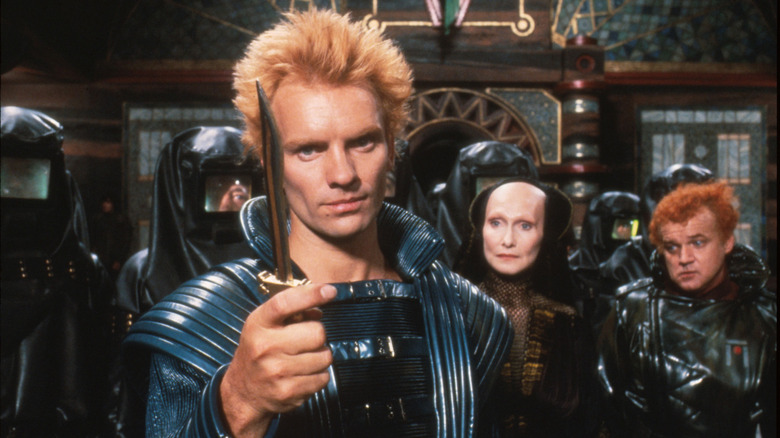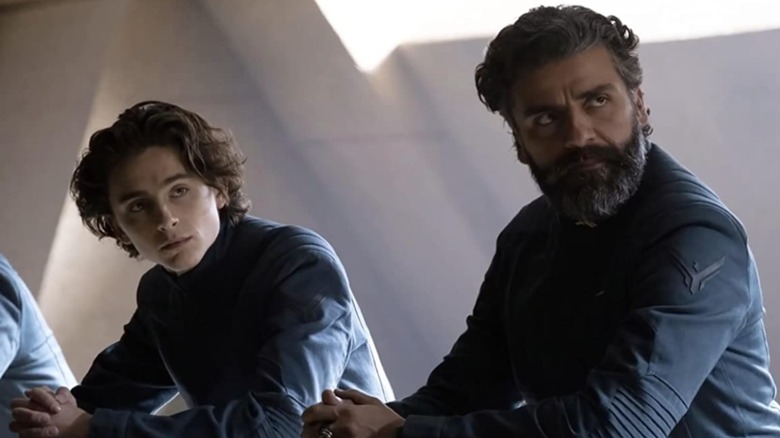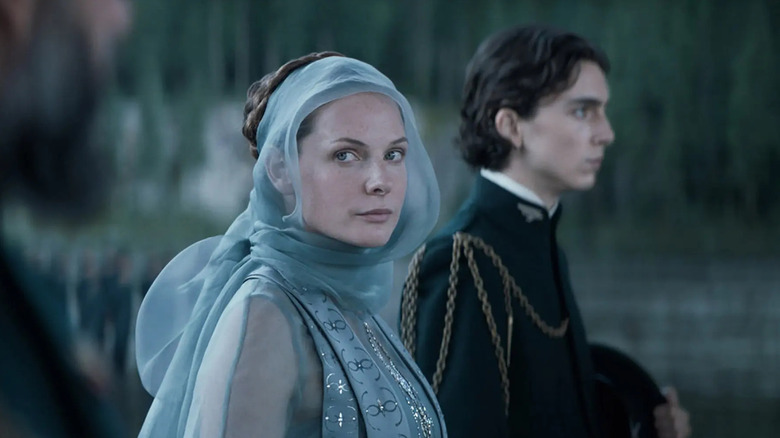Denis Villeneuve Avoided One Of David Lynch's Biggest Dune Mistakes
In 2021, Denis Villeneuve did the impossible: he made a "Dune" movie that was actually good. Whereas David Lynch's adaptation in 1984 was both a critical and financial disappointment, Villeneuve's first adaptation did well enough to get him a sequel, where he'll be covering the second half of Frank Herbert's novel. He also plans to get around to adapting "Dune: Messiah," the second book in the series. "To follow Paul Atreides and his full arc would be nice," he explained.
There were a lot of reasons why Villeneuve's adaptation works better so far than Lynch's. The most obvious is that special effects have improved a lot in the past 35 years, which means the giant worms in the story no longer look comically fake. The other clear benefit is that the studio allowed Villeneuve to split "Dune" in half.
Although the decision to split a book in two is often met with accusations of the studio shamelessly trying to squeeze as much money from viewers as possible, even the most cynical critic should agree that the densely-packed 700-page novel was never meant to be adapted into one movie. There are far, far too many things going on in the book for that. (And even with the split, plenty of cool scenes still had to be cut and a lot of the book's political intrigue had to be streamlined.) By allowing the story space to breathe and giving viewers time to care for the characters and grow accustomed to the hard world of Arrakis, the tragic nature of the story was allowed to be fully felt in Villeneuve's adaptation.
One difference Villeneuve attributes to his success, which may have been just as vital as the rest of the changes, is the way he adapted the books' dialogue.
Adapting the dialogue
One of the things that make the books so divisive is that the dialogue throughout is often very formal, unemotional — frequently criticized as stiff. The characters in "Dune," even the 14-year-old Paul at the beginning, will often talk like philosophy professors. These are characters who have been trained to be in complete control of their emotions after all, and that's reflected in the dialogue, but it also makes it tough for readers to connect with them on the same level as we'd connect with other sci-fi/fantasy protagonists.
"There are lines in the book that are beautiful to read, but that don't translate so well onscreen," Villeneuve explained. "I felt it would be wise to keep the language as simple as possible, so that it would never get in the way of the emotions. I would say the book is more intellectual, and the film is more emotional — but that is cinema."
And sure enough, the characters in the recent "Dune" movie are a lot more emotional than their book counterparts, even as they're still unusually stoic by Hollywood standards. The film includes a heartwarming scene between Paul (Timothée Chalamet) and his father Leto (Oscar Isaac) that does more to make us care about their father-son bond than pretty much any moment in the book. When Paul is put through the box of pain test, the film shows us Jessica (Rebecca Ferguson) dealing with much clearer stress and fear for her son's well-being than book Jessica shows. Although the movie is still often criticized for being a little too cold and unemotional, Villeneuve still did his best to heighten the emotions as much as he can while still staying true to the characters.
Avoiding voiceovers
The other adaptation problem was the sheer amount of internal dialogue going on in the book. With so many characters hiding information from the others, the book features plenty of moments where the point-of-view characters will be thinking to themselves. It always feels a little stilted in a book where a character's thoughts are represented as complete sentences, but it's even more awkward when it happens in a movie. Lynch's "Dune" was filled with characters thinking to themselves via whispered voiceovers, which was deemed the most efficient way of getting all the exposition into the movie so the plot could make sense. But this decision didn't work in "Blade Runner," and it certainly didn't work here.
"With no disrespect to the master, I didn't want to go that way," Villeneuve said. "The idea was to use cinematic elements instead of having voiceovers, that by being close to their intimate moments, we will feel or have a glimpse into their emotional state." He also devised a new form of sign language that Paul and Jessica used to communicate, which helped to visually communicate their thoughts in a more organic way than voiceovers. That choice was particularly helpful in the movie's third act, where Paul and Jessica need to escape from capture. The book has the two characters acting as a team without explicitly communicating to each other, and those thoughts would've been pretty hard to articulate with just the actors' facial expressions to work with.
With his more emotional, cinematic take on "Dune" paying off in spades, it's only going to make the long wait for "Dune: Part Two" all the more painful. But if the Bene Gesserit could wait thousands of years for their Kwisatz Haderach to arrive, I'm sure we can wait another year or two.


